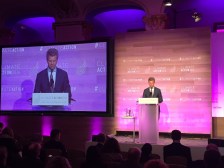The effort by federal agencies to use prizes and competitions to solve pressing problems is paying off.
A report by the Office of Science and Technology Policy, released today, highlights “remarkable results” from 87 prize competitions adopted by 25 agencies in fiscal year 2013 – which is more than an 85 percent spike from the previous year, according to Cristin Dorgelo, OSTP’s assistant director for grand challenges.
The increase can be attributed to “important steps that the Obama administration has taken to make prizes a standard tool in every agency’s toolbox,” Dorgelo wrote in a May 7 post on the OSTP blog.
President Barack Obama called on all federal agencies in 2009 to up their use of prizes to address some of the nation’s challenges. Under the presidential aegis, OSTP and the General Services Administration trained more than 1,200 agency employees. NASA also supported the effort, by having its Center for Excellence for Collaborative Innovation provide prize implementation services so agencies may experiment with these new approaches before rolling out their own capabilities.
Today’s report looks at several trends in government prize competitions, including the spike in prizes and their use to solve problems. In addition to the 85 percent yearly increase in prizes, the number of prizes conducted under the authority provided by the America COMPETES Act grew by more than half compared to 2012 and by nearly six-fold compared to 2011.
The prizes grew in value, too. Last year, 11 prizes had prize purses of $100,000 or greater. The Department of Health and Human Services offered 28 prizes in fiscal year 2013, a 50 percent increase compared with the previous year. The HHS challenges added up to $1.2 million in prize purses. The average purse size was $46,000, a 150 percent increase over the year before.
The report also highlights how agencies are using competitions more to find innovative solutions rather than for public education or outreach. The Environmental Protection Agency and HHS’ My Air, My Health Challenge called on innovators to create a personal and portable integrated system to monitor, report and assess air pollutants. The developers of the Conscious Clothing device , which could be sewn directly into clothing and could cost as little as $20 to scale, won the $100,000 prize
More prizes also went to IT-related solutions. Almost half of the prizes in fiscal year 2013 looked for software solutions, and many of these challenges sought to leverage the power of open government data. For example, the Energy Department’s Apps for Vehicles Challenge asked app developers to show how the open data on most vehicles can be used to enhance vehicle safety, fuel efficiency and comfort. DASH, which turns any car into a “smart” one, won the Judges’ Prize, and MyCarma, an app that generates a driver’s personal fuel economy label on new vehicles, was awarded the Popular Choice prize.






